BRAVE-NEW-WORLD-美丽新世界
BRAVE NEW WORLD 美丽新世界 ppt课件

(野蛮人拘留区).
Occasionally John get into the greatest power area, Central London. John first had the future to look at the night's "Brave New World", where the technology was exciting.
Brief Introduction
•
Protagonist “barbarians” John is a
failure of individual embryos incubated, he
and his mother, Linda, live in New
Mexico which has the “savage reservation”
1,Artificial incubation(人工孵化) ---the birth of mankind depend on the machinery in a neat and clean, no father and mother environment. No one will interfere with your career and marriage, but you have no home and family.
现代性批判视野下的《美丽新世界》
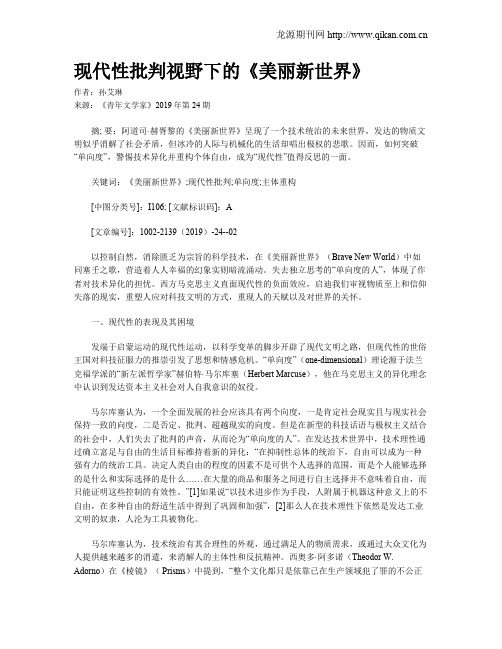
现代性批判视野下的《美丽新世界》作者:孙艾琳来源:《青年文学家》2019年第24期摘; 要:阿道司·赫胥黎的《美丽新世界》呈现了一个技术统治的未来世界,发达的物质文明似乎消解了社会矛盾,但冰冷的人际与机械化的生活却唱出极权的悲歌。
因而,如何突破“单向度”,警惕技术异化并重构个体自由,成为“现代性”值得反思的一面。
关键词:《美丽新世界》;现代性批判;单向度;主体重构[中图分类号]:I106; [文献标识码]:A[文章编号]:1002-2139(2019)-24--02以控制自然,消除匮乏为宗旨的科学技术,在《美丽新世界》(Brave New World)中如同塞壬之歌,营造着人人幸福的幻象实则暗流涌动。
失去独立思考的“单向度的人”,体现了作者对技术异化的担忧。
西方马克思主义直面现代性的负面效应,启迪我们审视物质至上和信仰失落的现实,重塑人应对科技文明的方式,重现人的天赋以及对世界的关怀。
一、现代性的表现及其困境发端于启蒙运动的现代性运动,以科学变革的脚步开辟了现代文明之路,但现代性的世俗王国对科技征服力的推崇引发了思想和情感危机。
“单向度”(one-dimensional)理论源于法兰克福学派的“新左派哲学家”赫伯特·马尔库塞(Herbert Marcuse),他在马克思主义的异化理念中认识到发达资本主义社会对人自我意识的奴役。
马尔库塞认为,一个全面发展的社会应该具有两个向度,一是肯定社会现实且与现实社会保持一致的向度,二是否定、批判、超越现实的向度。
但是在新型的科技话语与极权主义结合的社会中,人们失去了批判的声音,从而沦为“单向度的人”。
在发达技术世界中,技术理性通过确立富足与自由的生活目标维持着新的异化:“在抑制性总体的统治下,自由可以成为一种强有力的统治工具。
决定人类自由的程度的因素不是可供个人选择的范围,而是个人能够选择的是什么和实际选择的是什么……在大量的商品和服务之间进行自主选择并不意味着自由,而只能证明这些控制的有效性。
美丽新世界简介
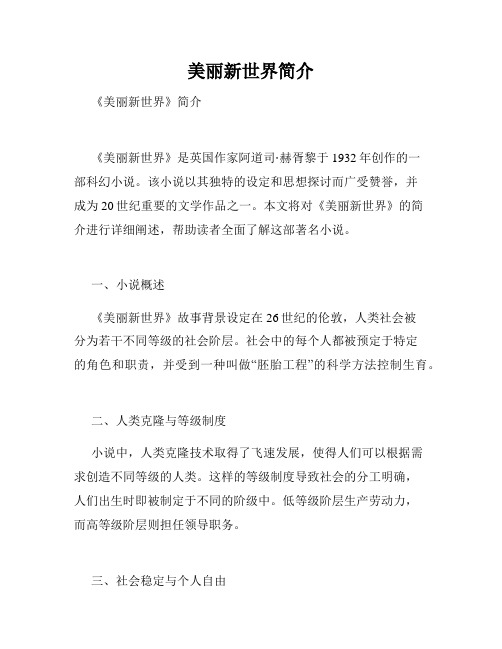
美丽新世界简介《美丽新世界》简介《美丽新世界》是英国作家阿道司·赫胥黎于1932年创作的一部科幻小说。
该小说以其独特的设定和思想探讨而广受赞誉,并成为20世纪重要的文学作品之一。
本文将对《美丽新世界》的简介进行详细阐述,帮助读者全面了解这部著名小说。
一、小说概述《美丽新世界》故事背景设定在26世纪的伦敦,人类社会被分为若干不同等级的社会阶层。
社会中的每个人都被预定于特定的角色和职责,并受到一种叫做“胚胎工程”的科学方法控制生育。
二、人类克隆与等级制度小说中,人类克隆技术取得了飞速发展,使得人们可以根据需求创造不同等级的人类。
这样的等级制度导致社会的分工明确,人们出生时即被制定于不同的阶级中。
低等级阶层生产劳动力,而高等级阶层则担任领导职务。
三、社会稳定与个人自由为了维持社会稳定,小说中的世界在人类克隆之初就剔除了传统家庭、爱情和个人意志的存在。
人们接受着教育、消费和药物的支配,生活在没有冲突和伤害的幸福与表面和谐之中。
然而,这种表面完美的社会构建下,隐藏着个人的情感压抑和人性的扭曲。
四、思想冲突与抗争小说通过描写主人公伯纳德·马克思与他的朋友约翰的故事,展现了这个虚构社会中的各种思想冲突和抗争。
伯纳德渴望自由和独立,对这个世界的不公感到不满,而约翰则是来自一个原始社会并不接受现有秩序的外来者。
他们的存在和行为引发了剧情的转折和反思。
五、对科技与人性的思考《美丽新世界》通过对科技与人性的思考,提出了一系列对人类未来发展的警示和反思。
赫胥黎对当时正在兴起的科学技术及其对社会和个体所带来的影响进行了深入探讨,呼吁保持人类尊严和自由的核心价值观。
六、小说的影响《美丽新世界》的问世引起了广泛的讨论和争议,尤其是对于科技发展和社会制度的挑战。
该小说对后来的许多作家和学者产生了深远的影响,成为虚构文学和社会学中的重要研究对象。
总结《美丽新世界》以其独特的设定和思想探讨,对于人类社会的未来发展提出了深刻的思考。
The brave new world美丽新世界 ppt
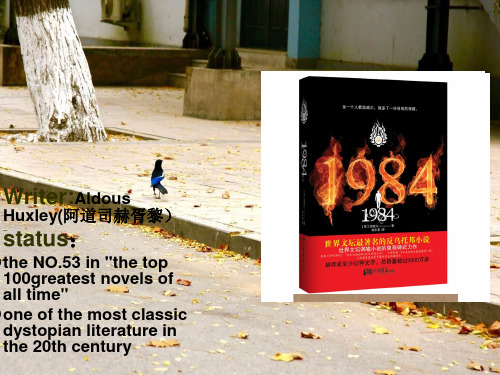
BRAVE NEW WORLD
• Aldous Huxley(阿道 司赫胥黎) • time:1894—1963
1:About the writer
• He was a grandson of
the famous biologist Thomas Henry Huxley(1825-1895)
BRAVE NEW WORLD 2:What‘s the Dystopia • A:First,what is the Utopia?
Writer:Aldous status:
Huxley(阿道司赫胥黎)
① the NO.53 in "the top 100greatest novels of all time" ② one of the most classic dystopian literature in the 20th century
• B:cacotopia, kakotopia(坎坷邦)
BRAVE NEW WORLD ---------------------------------
Dystopia
• A dystopia is a community or society that is in some important way undesirable or frightening. It is literally translated as ―notgood place‖( an antonym of utopia. ) • Such societies appear in many artistic works, particularly in stories set in a future. Dystopias are often characterized by dehumanization, totalitarian governments, environmental disaster , or other characteristics associated with a cataclysmic decline in society. Dystopian societies appear in many sub-genres of fiction and are often used to draw attention to real-world issues regarding society, environment, politics, economics, religion, psychology, ethics, science, and or technology, which if unaddressed could potentially lead to such a dystopia-like condition.
读《美丽新世界》——浅谈乌托邦与反乌托邦
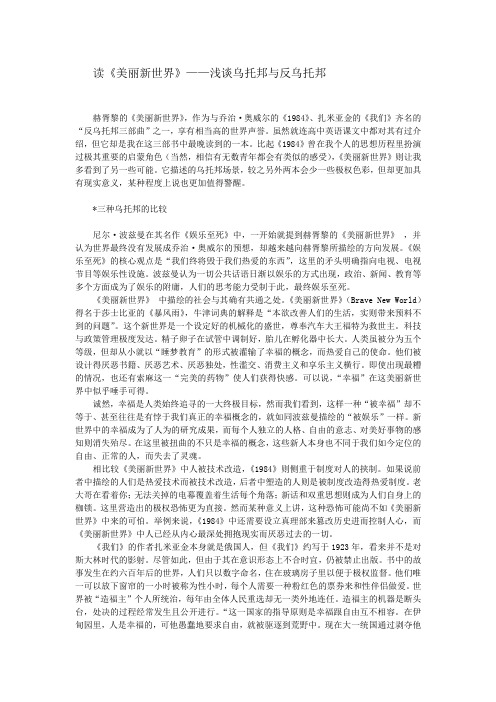
读《美丽新世界》——浅谈乌托邦与反乌托邦赫胥黎的《美丽新世界》,作为与乔治·奥威尔的《1984》、扎米亚金的《我们》齐名的“反乌托邦三部曲”之一,享有相当高的世界声誉。
虽然就连高中英语课文中都对其有过介绍,但它却是我在这三部书中最晚读到的一本。
比起《1984》曾在我个人的思想历程里扮演过极其重要的启蒙角色(当然,相信有无数青年都会有类似的感受),《美丽新世界》则让我多看到了另一些可能。
它描述的乌托邦场景,较之另外两本会少一些极权色彩,但却更加具有现实意义,某种程度上说也更加值得警醒。
*三种乌托邦的比较尼尔·波兹曼在其名作《娱乐至死》中,一开始就提到赫胥黎的《美丽新世界》,并认为世界最终没有发展成乔治·奥威尔的预想,却越来越向赫胥黎所描绘的方向发展。
《娱乐至死》的核心观点是“我们终将毁于我们热爱的东西”,这里的矛头明确指向电视、电视节目等娱乐性设施。
波兹曼认为一切公共话语日渐以娱乐的方式出现,政治、新闻、教育等多个方面成为了娱乐的附庸,人们的思考能力受制于此,最终娱乐至死。
《美丽新世界》中描绘的社会与其确有共通之处。
《美丽新世界》(Brave New World)得名于莎士比亚的《暴风雨》,牛津词典的解释是“本欲改善人们的生活,实则带来预料不到的问题”。
这个新世界是一个设定好的机械化的盛世,尊奉汽车大王福特为救世主。
科技与政策管理极度发达。
精子卵子在试管中调制好,胎儿在孵化器中长大。
人类虽被分为五个等级,但却从小就以“睡梦教育”的形式被灌输了幸福的概念,而热爱自己的使命。
他们被设计得厌恶书籍、厌恶艺术、厌恶独处,性滥交、消费主义和享乐主义横行。
即使出现最糟的情况,也还有索麻这一“完美的药物”使人们获得快感。
可以说,“幸福”在这美丽新世界中似乎唾手可得。
诚然,幸福是人类始终追寻的一大终极目标,然而我们看到,这样一种“被幸福”却不等于、甚至往往是有悖于我们真正的幸福概念的,就如同波兹曼描绘的“被娱乐”一样。
天津译国译民翻译公司被错误翻译的六部英文电影名
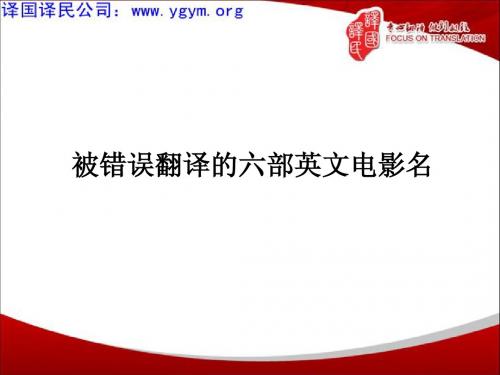
五、Pumpkin Eater 也许有人会译成《食南瓜的人》吧。 其实这也是来源于一首广为流传的童谣:"Peter, Peter, pumpkin eater, had a wife and couldn't keep her." 根据故事 情节,译做《太太的苦闷》似乎比较恰当。
六、Brave New World 有人译作《勇敢的新世界》 Aldous Huxley(英国作家,Thomas Huxley之孙)的一 本科幻小说名。早期有人译作《勇敢的新世界》,现 在恐怕很多人拿到原著,看到《美丽新世界》的题目 ,也要以为翻译错了。殊不知,这书题出自莎士比亚 的《暴风雨》一剧,Miranda的话:"How beauteous mankind is! O brave new world, that has such people in't!"这里brave一词取的是法语brave的意思,作“好” 解。Huxley写此书是反讽20世纪的机器文明,称它为 “大好”,其实并非如此。
二、Hobson's Choice 被译成《霍布逊的选择》 电影中主角名叫Hobson,表面上看也没有问题。可是 大概的情节是,这位Hobson先生是一位鞋店老板,不愿意 把大女儿嫁给店里的伙计,结果遭到三个女儿同盟的反对 ,于是屈从了她们。 在英语中Hobson's Choice也是一个成语,同样据American Heritage Dictionary,它的意思是:An apparently free choice that offers no real alternative. 出典大约是这样:After Thomas Hobson (1544?-1630), English keeper of a livery stable, from his requirement that customers take either the horse nearest the stable door o`r none 。电影巧用这个名字(莫如说将主角命名为Hobson),正为 了套这个典故。而译名恰好颠倒了意思。
BRAVENEWWORLD内容简介(AldousHuxley)

BRAVE NEW WORLD 美丽新世界Aldous HuxleyPlot Overview 情节一览The novel opens in the Central London Hatching and Conditioning Centre, where the Director of the Hatchery and one of his assistants, Henry Foster, are giving a tour to a group of boys. The boys learn about the Bokanovsky and Podsnap Processes that allow the Hatchery to produce thousands of nearly identical human embryos. During the gestation period the embryos travel in bottles along a conveyor belt through a factorylike building, and are conditioned to belong to one of five castes: Alpha, Beta, Gamma, Delta, or Epsilon. The Alpha embryos are destined to become the leaders and thinkers of the World State. Each of the succeeding castes is conditioned to be slightly less physically and intellectually impressive. The Epsilons, stunted and stupefied by oxygen deprivation and chemical treatments, are destined to perform menial labor. Lenina Crowne, an employee at the factory, describes to the boys how she vaccinates embryos destined for tropical climates.The Director then leads the boys to the Nursery, where they observe a group of Delta infants being reprogrammed to dislike books and flowers. The Director explains that this conditioning helps to make Deltas docile and eager consumers. He then tells the b oys about the “hypnopaedic” (sleep-teaching) methods used to teach children the morals of the World State. In a room where older children are napping, a whispering voice is heard repeating a lesson in “Elementary Class Consciousness.”Outside, the Director shows the boys hundreds of naked children engaged in sexual play and games like “Centrifugal Bumble-puppy.” Mustapha Mond, one of the ten World Controllers, introduces himself to the boys and begins to explain the history of the World State, focusing on the State’s successful efforts to remove strong emotions, desires, and human relationships from society. Meanwhile, inside the Hatchery, Lenina chats in the bathroom with Fanny Crowne about her relationship with Henry Foster. Fanny chides Lenina for going out with Henry almost exclusively for four months, and Lenina admits she is attracted to the strange, somewhat funny-looking Bernard Marx. In another part of the Hatchery, Bernard is enraged when he overhears a conversation between Henry and the Assistant Predestinator about “having” Lenina.After work, Lenina tells Bernard that she would be happy to accompany himon the trip to the Savage Reservation in New Mexico to which he had invited her. Bernard, overjoyed but embarrassed, flies a helicopter to meet a friend of his, Helmholtz Watson. He and Helmholtz discuss their dissatisfaction with the World State. Bernard is primarily disgruntled because he is too small and weak for his caste; Helmholtz is unhappy because he is too intelligent for his job writing hypnopaedic phrases. In the next few days, Bernard asks his superior, the Director, for permission to visit the Reservation. The Director launches into a story about a visit to the Reservation he had made with a woman twenty years earlier. During a storm, he tells Bernard, the woman was lost and never recovered. Finally, he gives Bernard the permit, and Bernard and Lenina depart for the Reservation, where they get another permit from the Warden. Before heading into the Reservation, Bernard calls Helmholtz a nd learns that the Director has grown weary of what he sees as Bernard’s difficult and unsocial behavior and is planning to exile Bernard to Iceland when he returns. Bernard is angry and distraught, but decides to head into the Reservation anyway.On the Reservation, Lenina and Bernard are shocked to see its aged and ill residents; no one in the World State has visible signs of aging. They witness a religious ritual in which a young man is whipped, and find it abhorrent. After the ritual they meet John, a fair-skinned young man who is isolated from the rest of the village. John tells Bernard about his childhood as the son of a woman named Linda who was rescued by the villagers some twenty years ago. Bernard realizes that Linda is almost certainly the woman mentioned by the Director. Talking to John, he learns that Linda was ostracized because of her willingness to sleep with all the men in the village, and that as a result John was raised in isolation from the rest of the village. John explains that he learned to read using a book called The Chemical and Bacteriological Conditioning of the Embryo and The Complete Works of Shakespeare, the latter given to Linda by one of her lovers, Popé. John tells Bernard that he is eager to see the “Other Place”—the “brave new world” that his mother has told him so much about. Bernard invites him to return to the World State with him. John agrees but insists that Linda be allowed to come as well.While Lenina, disgusted with the Reservation, takes enough soma to knock her out for eighteen hours, Bernard flies to Santa Fe where he calls Mustapha Mond and receives permission to bring John and Linda back to the World State. Meanwhile, John breaks into the house where Lenina is lying intoxicated and unconscious, and barely suppresses his desire to touch her. Bernard, Lenina, John, and Linda fly to the World State, where the Director is waiting to exile Bernard in front of his Alpha coworkers. But Bernard turns the tables by introducing John and Linda. The shame of being a “father”—the very word makes the onlookers laugh nervously—causes the Director to resign, leaving Bernard free to remain in London.John becomes a hit with London society because of his strange life led on the Reservation. But while touring the factories and schools of the World State, John becomes increasingly disturbed by the society that he sees. His sexual attraction to Lenina remains, but he desires more than simple lust, and he finds himself terribly confused. In the process, he also confuses Lenina, who wonders why John does not wish to have sex with her. As the discoverer and guardian of the “Savage,” Bernard also becomes popular. He quickly takes advantage of his new status, sleeping with many women and hosting dinner parties with important guests, most of whom dislike Bernard but are willing to placate him if it means they get to meet John. One night John refuses to meet the guests, including the Arch-Community Songster, and Bernard’s social standing plummets.After Bernard introduces them, John and Helmholtz quickly take to each other. John reads Helmholtz parts of Romeo and Juliet, but Helmholtz cannot keep himself from laughing at a serious passage about love, marriage, and parents—ideas that are ridiculous, almost scatological in World State culture. Fueled by his strange behavior, Lenina becomes obsessed with John, refusing Henry’s invitation to see a feely. She takes soma and visits John at Bernard’s apartment, where she hopes to seduce him. But John responds to her advances with curses, blows, and lines from Shakespeare. She retreats to the bathroom while he fields a phone call in which he learns that Linda, who has been on permanent soma-holiday since her return, is about to die. At the Hospital for the Dying he watches her die while a group of lower-caste boys receiving their “death conditioning” wonder why she is so unattractive. The boys are simply curious, but John becomes enraged. After Linda dies, John meets a group of Delta clones who are receiving their soma ration. He tries to convince them to revolt, throwing the soma out the window, and a riot results. Bernard and Helmholtz, hearing of the riot, rush to the scene and come to John’s aid. After the riot is calmed by police with soma vapor, John, Helmholtz, and Bernard are arrested and brought to the office of Mustapha Mond.John and Mond debate the value of the World State’s policies, John arguing that they dehumanize the residents of the World State and Mond arguing that stability and happiness are more important than humanity. Mond explains that social stability has required the sacrifice of art, science, and religion. John protests that, without these things, human life is not worth living. Bernard reacts wildly when Mond says that he and Helmholtz will be exiled to distant islands, and he is carried from the room. Helmholtz accepts the exile readily, thinking it will give him a chance to write, and soon follows Bernard out of theroom. John and Mond continue their conversation. They discuss religion and the use of soma to control negative emotions and social harmony.John bids Helmholtz and Bernard good-bye. Refused the option of following them to the islands by Mond, he retreats to a lighthouse in the countryside where he gardens and attempts to purify himself by self-flagellation. Curious World State citizens soon catch him in the act, and reporters descend on the lighthouse to film news reports and a feely. After the feely, hordes of people descend on the lighthouse and demand that John whip himself. Lenina comes and approaches John with her arms open. John reacts by brandishing his whip and screaming “Kill it! Kill it!” The intensity of the scene causes an orgy in which John takes part. The next morning he wakes up and, overcome with anger and sadness at his submission to World State society, hangs himself. Context 背景Aldous Huxley was born in Surrey, England, on July 26, 1894, to an illustrious family deeply rooted in England’s literary and scientific tradition. Huxley’s father, Leonard Huxley, was the son of Thomas Henry Huxley, a well-known biologist who gained t he nickname “Darwin’s bulldog” for championing Charles Darwin’s evolutionary ideas. His mother, Julia Arnold, was related to the important nineteenth-century poet and essayist Matthew Arnold.Raised in this family of scientists, writers, and teachers (his father was a writer and teacher, and his mother a schoolmistress), Huxley received an excellent education, first at home, then at Eton, providing him with access to numerous fields of knowledge. Huxley was an avid student, and during his lifetime he was renowned as a generalist, an intellectual who had mastered the use of the English language but was also informed about cutting-edge developments in science and other fields. Although much of his scientific understanding was superficial—he was easily convinced of findings that remained somewhat on the fringe of mainstream science—his education at the intersection of science and literature allowed him to integrate current scientific findings into his novels and essays in a way that few other writers of his time were able to do. Aside from his education, another major influence on Huxley’s life and writing was an eye disease contracted in his teenage years that left him almost blind. As a teenager Huxley had dreamed about becoming a doctor, but the degeneration of his eyesight prevented him from pursuing his chosen career. It also severely restricted the activities he could pursue. Because of his near blindness, he depended heavily on his first wife, Maria, to take care of him. Blindness and vision are motifs that permeate much of Huxley’s writing.After graduating from Oxford in 1916, Huxley began to make a name for himself writing satirical pieces about the British upper class. Though these writings were skillful and gained Huxley an audience and literary name, they were generally considered to offer little depth beyond their lightweight criticisms of social manners. Huxley continued to write prolifically, working as an essayist and journalist, and publishing four volumes of poetry before beginning to work on novels. Without giving up his other writing, beginning in 1921, Huxley produced a series of novels at an astonishing rate: Crome Yellow was published in 1921, followed by Antic Hay in 1923, Those Barren Leaves in 1925, and Point Counter Point in 1928. During these years, Huxley left his early satires behind and became more interested in writing about subjects with deeper philosophical and ethical significance. Much of his work deals with the conflict between the interests of the individual and society, often focusing on the problem of self-realization within the context of social responsibility. These themes reached their zenith in Huxley’s Brave New World, published in 1932. His most enduring work imagined a fictional future in which free will and individuality have been sacrificed in deference to complete social stability.Brave New World marked a step in a new direction for Huxley, combining his skill for satire with his fascination with science to create a dystopian (anti-utopian) world in which a totalitarian government controlled society by the use of science and technology. Through its exploration of the pitfalls of linking science, technology, and politics, and its argument that such a link will likely reduce human individuality, Brave New World deals with similar themes as George Orwell’s famous novel 1984. Orwell wrote his novel in 1949, after the dangers of totalitarian governments had been played out to tragic effect in World War II, and during the great struggle of the Cold War and the arms race which so powerfully underlined the role of technology in the modern world. Huxley anticipated all of these developments. Hitler came to power in Germany a year after the publication of Brave New World. World War II broke out six years after. The atomic bomb was dropped thirteen years after its publication, initiating the Cold War and what President Eisenhower referred to as a frightening buildup of the “military-industrial complex.” Huxley’s novel seems, in many ways, to prophesize the major themes and struggles that dominated life and debate in the second half of the twentieth century, and continue to dominate it in the twenty-first.After publishing Brave New World, Huxley continued to live in England, making frequent journeys to Italy. In 1937 Huxley moved to California. An ardent pacifist, he had become alarmed at the growing military buildup in Europe, and determined to remove himself from the possibility of war. Already famous as a writer of novels and essays, he tried to make a living as ascreenwriter. He had little success. Huxley never seemed to grasp the requirements of the form, and his erudite literary style did not translate well to the screen.In the late forties, Huxley started to experiment with hallucinogenic drugs such as LSD and mescaline. He also maintained an interest in occult phenomena, such as hypnotism, séances, and other activities occupying the border between science and mysticism. Huxley’s experiments with drugs led him to write several books that had profound influences on the sixties counterculture. The book he wrote about his experiences with mescaline, The Doors of Perception, influenced a young man named Jim Morrison and his friends, and they named the band they formed The Doors. (The phrase, “the doors of perception” comes from a William Blake poem called The Marriage of Heaven and Hell.) In his last major work, Island, published in 1962, Huxley describes a doomed utopia called Pala that serves as a contrast to his earlier vision of dystopia. A central aspect of Pala’s ideal culture is the use of a hallucinogenic drug called “moksha,” which provides an interesting context in which to view soma, the drug in Brave New World that serves as one tool of the totalitarian state. Huxley died on November 22, 1963, in Los Angeles. Utopias and DystopiasBrave New World belongs to the genre of utopian literature. A utopia is an imaginary society organized to create ideal conditions for human beings, eliminating hatred, pain, neglect, and all of the other evils of the world.The word ut opia comes from Sir Thomas More’s novel Utopia (1516), and it is derived from Greek roots that could be translated to mean either “good place” or “no place.” Books that include descriptions of utopian societies were written long before More’s novel, however. Plato’s Republic is a prime example. Sometimes the societies described are meant to represent the perfect society, but sometimes utopias are created to satirize existing societies, or simply to speculate about what life might be like under different conditions. In the 1920s, just before Brave New World was written, a number of bitterly satirical novels were written to describe the horrors of a planned or totalitarian society. The societies they describe are called dystopias, places where things are badly awry. Either term, utopia or dystopia, could correctly be used to describe Brave New World.。
Brave New World 美丽新世界

Huxley said that Brave New World was inspired by the utopian novels of H. G. Wells, including A Modern Utopia (1905) and Men Like Gods (1923).Wells' hopeful vision of the future's possibilities gave Huxley the idea to begin writing a parody of the novel, which became Brave New World.
Helmholtz Watson –
handsome and successful Alpha-Plus lecturer at the
College of Emotional Engineering and a friend of
Bernard.
Mustapha Mond – Resident World Controller of
He remains committed to values that exist only in his poetry, first spurning Lenina for failing to live up to his Shakespearean ideal and then the entire utopian society. He then ostracizes himself from society and attempts to purify himself of "sin" (desire), but is finally unable to do so and hangs himself in despair.
- 1、下载文档前请自行甄别文档内容的完整性,平台不提供额外的编辑、内容补充、找答案等附加服务。
- 2、"仅部分预览"的文档,不可在线预览部分如存在完整性等问题,可反馈申请退款(可完整预览的文档不适用该条件!)。
- 3、如文档侵犯您的权益,请联系客服反馈,我们会尽快为您处理(人工客服工作时间:9:00-18:30)。
In this brave new world, because of the social and biological controlling technology develops quickly, people are controlled by human genetics companies which ruled by political figures and dolls.
• 小说具有强烈的讽刺性,无处不充满批判 的格调。其中最深刻的,就是对统治者将 人们的思想死死地控制住,而非简单的极 权和奴役统治。
• 在科技力量的作用下,“人”不再是传统 意义上的具有独立、探索、自由、叛逆、 追求真理等性格的人,而只是社会机体的 一个细胞。统治者的良苦用心就是:
• “只有使整个社会充满这样的人,社会才 会稳定,人们才会走向终极幸福。”
My opinions
• Development of society • Happiness guided by …? • Human beings
All here ! Thank you !!!!!!!
以上有不当之处,请大家给与批评指正, 谢谢大家!
16
(野蛮人拘留区).
Occasionally John get into the greatest power area, Central London. John first had the future to look at the night's "Brave New World", where the technology was exciting.
3,Hypnosis education(催眠教育)---which can not be used in science education, only used on those who needn’t thinking of the moral education. This is to get everyone accustomed to doing any work.
In such a social life, people lost the suffering rights, they don’t know what’s the fear, sadness and pain.
Because suffering causes too high a price compared to the reality which often looks very cheap and well-being.
1,Artificial incubation(人工孵化) ---the birth of mankind depend on the machinery in a neat and clean, no father and mother environment. No one will interfere with your career and marriage, but you have no home and family.
4,Sex and Love ---in this society, monogamy is not encouraged, in order to avoid feelings of depression caused by the strong work, the human beings are arranged from children to do all sorts of sexual games. As long as adults are interested in each other, they can have a relationship. No love, no marriage proposal before the hard pursuit, no payment for the other party.
But soon he found that the people of London have been relying on "Soma" creating the illusion of happiness all the time. "Barbarian" John would like to change this "new world" , but facing the huge machine in front, a "savage" only felt thin, pale and weak.
2,Condition setting(条件设置)---according to the human genes people are divided into five classes, they are engaged in all kinds of areas. In order to save resources, each class has certain mental and physical defects to make sure those useful materials can grow faster.
• He is a prolific British writer, writing a total of more than 50 novels, poetry, philosophy, literature and travel, the most famous work is the novel “Brave New World. " As a biologist's son, He had a good education when young , then, graduated from Eton College and Oxford University.
This rule begins from the gene and fe a deep impression are a few keywords:
1,Artificial incubation 2,Condition setting 3,Hypnosis education 4,Sex and Love
• Although the eyesight was almost losing, by learning Braille(盲人字典) he gradually began to write.He has created a number of novel and become a star in the 20's figure who in 1932 created the “Brave New World”.
Brief Introduction
•
Protagonist “barbarians” John is a
failure of individual embryos incubated, he
and his mother, Linda, live in New
Mexico which has the “savage reservation”
美丽新世界
Brave New World
阿道司.赫胥黎 Aldous Huxley
Written in 1932, before the outbreak of the Second World War.
About the Author
• Aldous Huxley (1894-1962) 阿道司.赫胥黎
